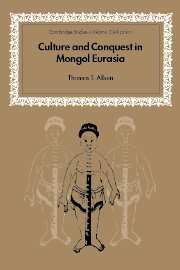Book contents
20 - Agency
Published online by Cambridge University Press: 04 September 2009
Summary
In this discussion of agency we will begin with specifics and then move to more general considerations: that is, we will look first at the historical evidence and second at the ethnological.
The argument that the Mongols were the prime movers in this exchange rests on a firm evidentiary foundation. As we have seen, Mongolian rulers ordered and patronized many exchanges, and one of the chief conduits of exchange and the key cultural broker of the era was an ethnic Mongol, Bolad Aqa. Further, and far more persuasive, it was the Chinggisids who created, consciously or unconsciously, innumerable opportunities for cross-cultural and transcontinental contact. To put it another way, the major carriers of foreign cultural wares from one end of Eurasia to the other were for the most part acting as agents of the empire; these included diplomats, military personnel, administrators, technologists, artisans, scholars, merchants, and hostages, just to name the most obvious.
What traveled across the continent did so in large part because it brought comfort, prestige, economic profit, or political advantage to the Mongolian elite. The chronology of these exchanges affirms such a conclusion, since the periodization of contact can be tied to datable “events,” transitional moments in the history of the Mongolian Empire. Three such moments are readily discernible in the historical record.
- Type
- Chapter
- Information
- Culture and Conquest in Mongol Eurasia , pp. 193 - 202Publisher: Cambridge University PressPrint publication year: 2001

